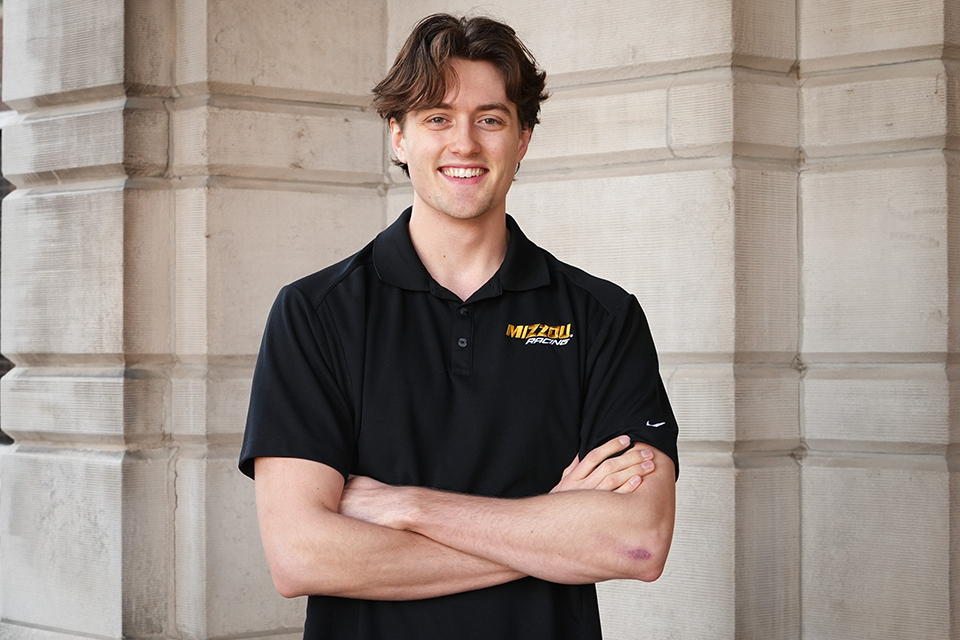May 05, 2024

Hayden Higgins didn’t always want to become an electrical engineer. Captivated by the endless ways electrical engineering touches every bit of technology, Higgins changed course from pre-medicine to a double major in electrical engineering and physics.
That electrical engineering (EE) background proved pivotal for Higgins as a member of the Mizzou Racing team, where he helped build the school’s first electric formula car. To him, that hands-on experience is what makes a student into a great engineer.
Following graduation, Higgins will begin his career at SpaceX as an electrical design engineer working on Starlink satellites.
Continue reading for a Q&A with Higgins about his experience at Mizzou.
What made you interested in your major?
In my freshman year, I was interested in neuroscience and psychiatry, so I was taking Chemistry II as a pre-med prerequisite. We had a unit on galvanic cells (batteries) and I was really confused by all the different units. I knew that volts and amps “measure electricity,” but why do we need both? What is a watt and why does it not have electrical units in its definition? What is the difference between a Weber and a Tesla? At some point I realized I was spending way more of my time reading about batteries and electrostatics than on readings for any of my actual classes, so that was when I decided on the engineering route.
Since then, I’ve been amazed by the scope of EE; it at least grazes every single piece of technology that drives the world today. Information theory, communication systems, power conversion and distribution, manufacturing, electronics, integrated circuits, embedded software, machine learning – there are tons of directions to go after graduation and it’s hard to make a wrong choice.
How did you get involved at Mizzou?
By far, my largest involvement has been with Mizzou Racing and Mizzou Electric Racing. I was fortunate to be at Mizzou at a pivotal time for these teams. As a sophomore, I joined a crew that struggled to generate momentum on the electric formula car project for several years. Now as a senior, I’m part of the team which built the first electric formula car to ever come out of the university.
My teammates are some of the most driven and talented individuals I think I may ever have the chance to work with and I’m extremely proud of what we’ve accomplished in two years. It will be fascinating to see what they go on to achieve next, most of them still have several more years with the team.
I was also an undergraduate researcher with Dr. Kovaleski in electromagnetics and metamaterials and later, with Dr. Huang in power electronics. Early in college, I also volunteered at the Health and Neuroscience Center under Dr. Froeliger’s group.
What’s your favorite Mizzou Engineering memory?
My favorite Mizzou Engineering memory was when we competed at the Texas Autocross Invitational at University of Texas Arlington. It was 18 hours round trip for a two-day weekend event. We broke a lot of stuff on both of our race cars, but it was the first time the electric car got to really stretch its legs and compete in a race. It was so gratifying to finally feel the insane acceleration and speed of the car after more than a year of grinding on the project and coming up slightly short at competition a few months earlier.
What’s next for you after graduation?
I’ve decided to accept an offer to join SpaceX as an electrical design engineer. I’ll be working on the newest Starlink satellites, which support “Direct to Cell,” a technology to enable high data rate communications between low-earth orbit satellites directly to your cell phone (as opposed to an intermediate modem/antenna setup, which beams your signal to and from space).
Depending on my experience there, and if I feel like I can’t pick these things up independently, I’d consider pursuing a master’s degree or Ph.D. to learn more about communication systems, radio frequency antenna design, integrated circuit design or possibly power electronics.
What would you tell someone who’s interested in coming to Mizzou?
I would tell anyone interested in coming to Mizzou that it’s a good place to develop your engineering skill set and from what I can see, it’s aggressively trending upward. I would point out that no institution is going to turn you into a great engineer because that’s totally on you as an individual. The only way to get good is to actually do things. After high school, you won’t get credit for simply being smart and having potential if you have nothing tangible to show for it. For me, the FSAE teams were the best outlet, but Mizzou has tons of resources to support you if you want to join some of the other teams or go after your own personal design projects.
With that said, the college plans to build an awesome new facility next to Lafferre Hall, they’re hiring lots of driven professors, they’re introducing new degree programs. And generally, it seems like things are headed in a really cool direction. It’s a solid time to get in at Mizzou.